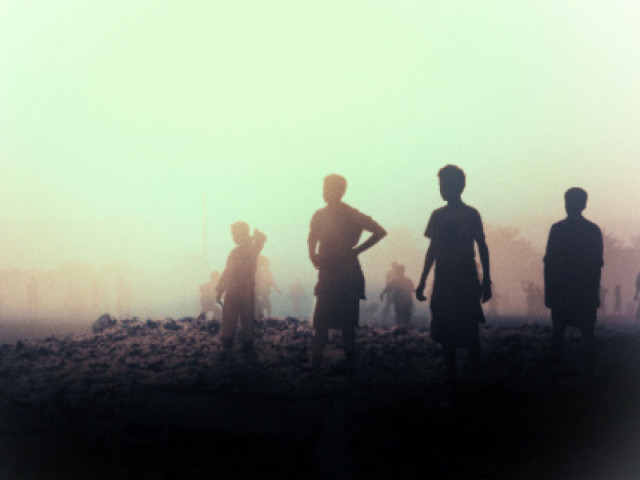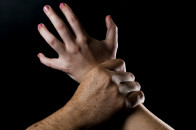Trash pickers: Frail and forgotten — the children in the shadows
For these boys and girls, every day is one that they wish had never happened.

For these boys and girls, every day is one that they wish had never happened.
On a dark, chilly night, the heaps of garbage around Faizabad were surrounded by young trash pickers. Mostly between the ages of five and 13, they shivered in the cold, as their tiny, yet rough, workman-like hands fished through piles of waste.
Among the group was a little boy, his faces, hands and clothes covered in muck, and his skin showing signs of one or more serious skin conditions. The Express Tribune spoke to him as he ate the remains of a discarded banana — now nothing more than a blackened peel.
“I really like bananas but I cannot afford to buy them,” said Abbas, a seven-year-old from conflict-riddled Bajaur Agency. He did not take a break to talk, as he quickly picked up a yogurt box with something left in it, ignoring the used diaper right next to it.
Abbas, his mother and five younger siblings shifted to Faizabad in 2010 after his father was killed during a military operation in the tribal agency. Now he is the sole breadwinner for his family.

“I work from early morning till after sunset and earn Rs200 to Rs300 a day for my mother,” he said, ignoring the pungent smell of his ‘worksite’.
He was a nursery student when his school was blown up by militants. Though he was a small child, the image of a pile of rubble that used to be his school is still fresh in his mind.
“My classroom was a pile of gravel.”
Even at his young age, Abbas recognises the value of education. “I want to get educated so I can earn lots of money instead of doing this.”
This, was a specific reference to the hazards he faces every day. While collecting reusable trash items, he comes across hospital waste, such as syringes and containers filled with blood and other biological hazards, along with animal carcasses and offal.
After a hard day’s work filling up their bags with recyclable treasures, the children lug them away on their frail shoulders to contractors around the area.

Sajid looked around 10, but wasn’t sure of his age. He walked with a limp, caused by a shard of glass that cut him as he fished through medical waste near the Pakistan Institute Medical Sciences, hoping to find syringes.
Though there are several non-governmental organisations working to help such children, none of them have the accurate data on child trash-pickers. The Society for the Protection of the Rights of the Child (SPARC) estimates that there are around 5,000 such children in the twin cities.
“As many as 300 children pick through trash in Pirwadhai alone,” says Sohail Ahmad, project manager of the SPARC Drop-in-Centre, which helps destitute children.
A sharp increase has been witnessed in the number of children begging or doing such jobs in Islamabad and Rawalpindi since the recent floods and military operations in the tribal areas.
In most cases, there are middlemen who engage these children. For all of the hazards the work involves, the children only receive a pittance, while their handlers keep the lion’s share, Ahmad said.
Even the right to health seems a luxury these children can ill-afford.
Dermatologist Dr Nadeem Ahmad Khan Niazi told The Express Tribune that rag-picking children are vulnerable to almost all diseases imaginable.
“The rag-pickers are susceptible to diseases like tuberculosis and cancer due to their exposure to hazardous materials. Diarrhoea, malaria and skin diseases are common among them,” Dr Niazi said.
Scavengers are treated as social outcasts and have to bear verbal and sometimes physical abuse from local residents or even their fellow trash-pickers. “Most of them are vulnerable to sexual abuse as they sleep in parking lots, on pavements and at mazaars,” Ahmad said, adding that in most cases, the children ask the operators of roadside stalls to act as their banks, which in turn puts the adults in a position to sexually exploit them.
As the rich and powerful on the other side of the capital rush to legislate in the favour of others with wealth and power, these children are a constant reminder that a society is not judged on how well they keep their kings, but on how they treat the peasants among them.
Published in The Express Tribune, March 13th, 2013.



















COMMENTS
Comments are moderated and generally will be posted if they are on-topic and not abusive.
For more information, please see our Comments FAQ